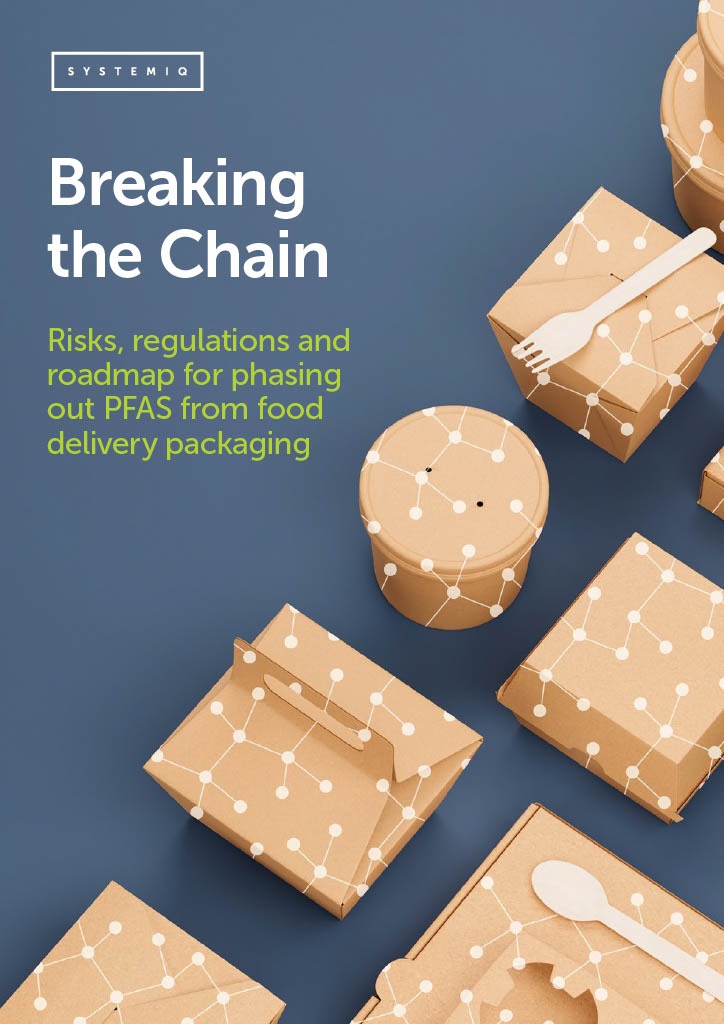Breaking the Chain – risks, regulations, and roadmap for phasing out PFAS from food delivery packaging
The global food delivery industry is booming, but within the convenience of takeaway packaging lies a hidden risk: PFAS, or “forever chemicals”. Widely used for their water- and grease-resistant properties, PFAS are linked to severe health issues such as hormone disruption, cancer, and immune disorders.
With regulation of PFAS globally becoming tighter and more fragmented, a new Systemiq study shows that phasing out PFAS from food delivery packaging is feasible, and presents actionable recommendations for businesses and policymakers for managing this transition in safe and sustainable ways.
In recent years, food delivery companies have made significant efforts to reduce single-use plastics by switching to fibre-based and paper packaging. However, to make these materials water- and grease-resistant, PFAS are often used as linings – unintentionally creating another set of challenges. As businesses work to phase out PFAS, it’s crucial not to repeat this mistake. A holistic approach must consider potential unintended consequences, balancing sustainability, cost, and functionality. When it comes to phasing out PFAS in food delivery packaging, packaging companies, such as BioPak, and delivery restaurants, such as Guzman y Gomez, have shown that, with the right solutions, this transition is acheivable.
Systemiq’s new study, Breaking the Chain: Risks, Regulations, and Roadmap for Phasing Out PFAS from Food Delivery Packaging, explores this issue in depth. PFAS are widely used in food delivery packaging, with one study identifying PFAS in 75% of disposable food packaging samples across six European Countries. However, their persistence in the environment and bioaccumulation in living organisms pose significant risks, which have made PFAS the focus of tightening regulations globally.
Navigating an evolving, fragmented regulatory landscape
However, the regulatory landscape remains fragmented, varying across jurisdictions in terms of definitions, thresholds, and approaches. While some regions, like the EU, are moving toward comprehensive bans on non-essential PFAS, others, including parts of the US, are focusing on partial phaseouts. Navigating such a complex and fragmented landscape is becoming a real challenge for businesses.
Breaking the Chain maps out the evolving regulatory landscape and highlights key implications for business. While businesses can remove PFAS now, efficient and rapid phase out relies on policymakers to:
- provide clarity and alignment on definitions and detection limits of PFAS.
- provide clear phaseout regulations and work towards international harmonisation to catalyse industry action and level the playing field.
- deploy targeted support for the scale-up of safer alternatives that are also sustainable in the local context.
- develop a broader policy framework that integrates hazard, pollution and sustainability priorities to deliver chemicals that are safe, and sustainable by design.
Actionable recommendations for businesses
Breaking the Chain outlines a clear path forward, showing that cost-competitive, PFAS-free alternatives are already in use at scale, with companies such as 3M and BioPak leading the way. However, businesses looking to proactively phase out PFAS currently face key challenges: identifying areas for substitution, selecting safer alternatives, and implementing these alternatives effectively.
The study further highlights that PFAS phase out strategies should be situated within broader sustainable packaging priorities. Avoidance of unnecessary uses and alternative models (such as reuse) should be considered first before taking decisions to substitute either the barrier material or the packaging material more broadly.
Importantly, the report stresses that collaboration between businesses and policymakers is essential. It urges policymakers to play a catalytic role by providing clear definitions, regulatory certainty and targeted incentives. Global harmonisation efforts – such as those through the Stockholm Convention – will also be critical for creating a safer and more sustainable future for food delivery packaging.
Thank you to Uber Eats for commissioning this report and acting as a key adviser and partner. The views expressed in this report do not necessarily represent those of Uber Eats.


